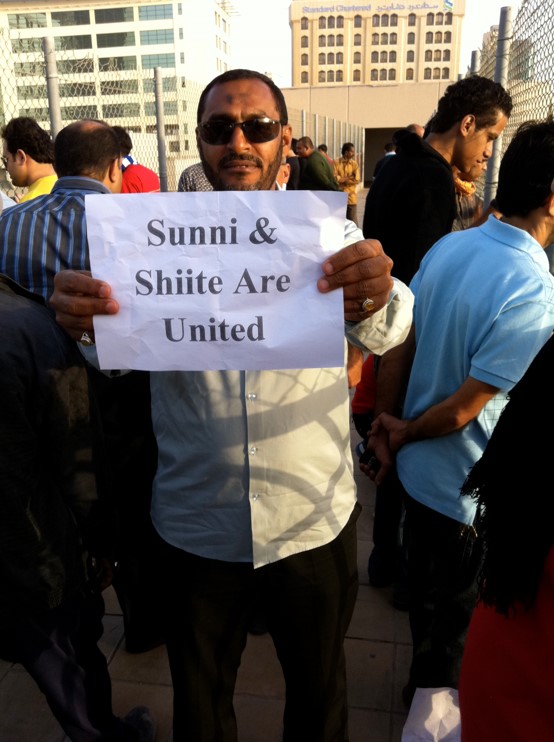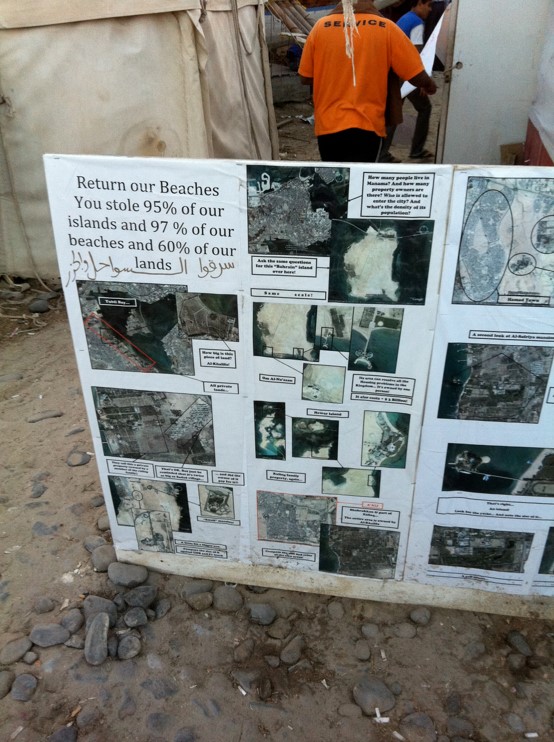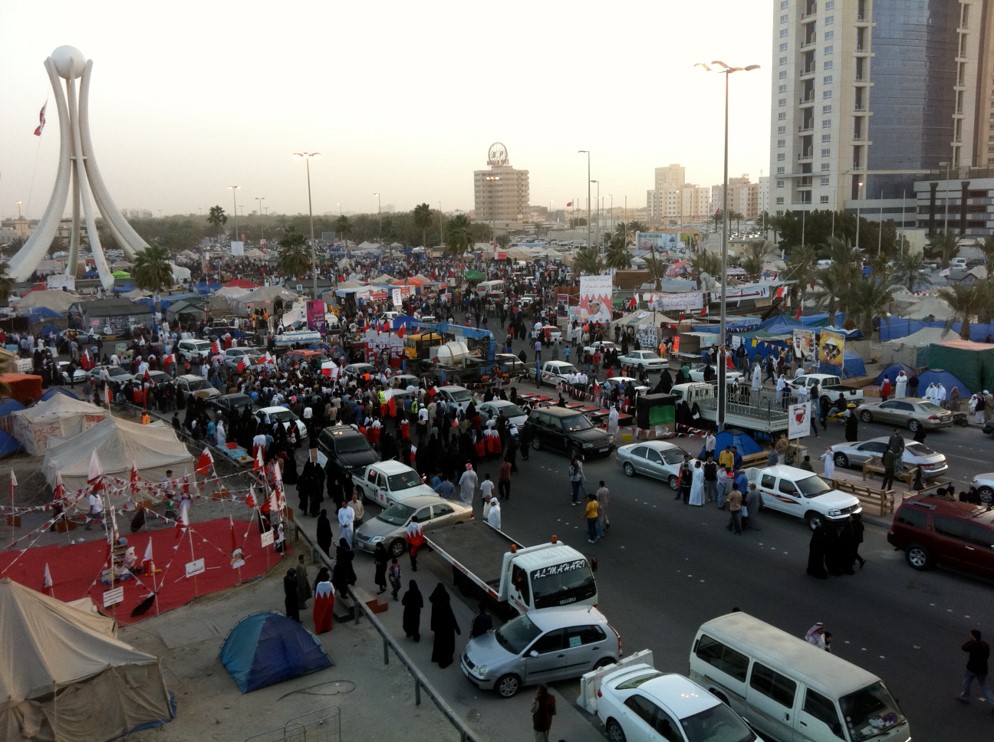20 March 2017 - Political opposition leader Ebrahim Sharif was today charged with "inciting hatred against the regime" under article 165 of Bahrain's penal code for messages he wrote on social media. Sharif was previously imprisoned from 2011 to 2015, and then again from 2015 to 2016 on similar charges stemming from his involvement in the pro-democracy movement and speeches he delivered. He could now face up to three more years in prison. We, the undersigned, strongly condemn the prosecution of Ebrahim Sharif on charges related solely to his free expression, and we call on the Government of Bahrain to cease all judicial harassment of peaceful opposition activists and human rights defenders.
Ebrahim Sharif is the former Secretary-General of the National Democratic Action Society (Wa’ad), a secular opposition group. Sharif was released following questioning by the public prosecution this morning. However, it is currently unclear whether the case will be transferred to the courts, or if the government has imposed a travel ban on the political leader after today's new charges. The authorities have charged Sharif under articles 165 and 172 of Bahrain’s penal code, which respectively criminalize “inciting hatred” against the government (article 165) and against “factions of society” (article 172). The charges violate his right to free expression as enshrined in article 19 of the Universal Declaration of Human Rights (UDHR) and article 19 of the International Covenant on Civil and Political Rights (ICCPR), which Bahrain acceded to in 2006. Sharif’s interrogation comes two weeks after Bahrain’s Ministry of Justice and Islamic Affairs (MOJ) launched legal proceedings to dissolve Wa’ad over unsubstantiated allegations of “incitement of acts of terrorism and promoting violent and forceful overthrow of the political regime.” The first court hearing for the dissolution was held today.
During this morning's questioning, the public prosecution presented to Ebrahim Sharif seven tweets he posted that covered a variety of topics. We, the undersigned, have reviewed Sharif’s tweets, and could find nothing to support the charges against him.
The tweets included a response to a statement by Tunisia's Minister of Interior and a tweet of Amnesty International campaign materials on Bahraini prisoners of conscience. Among the tweets Sharif was questioned over were messages related to Abdulla Al Ajooz, a Bahraini teenager who died in February 2017 during arrest. Sharif questioned the official narrative of Al Ajooz's death and referred to the deceased as a "martyr." Sharif’s tweets also criticized the MOJ decision to dissolve political opposition societies, asking, "What remains of the decor of the democratic state?"
Sayed Ahmed Alwadaei, Director of Advocacy, Bahrain Institute for Rights and Democracy (BIRD): "One by one, the Government of Bahrain has sought to silence every single outspoken critic of the regime's abuses. Now they have come to Ebrahim Sharif, the last openly critical opposition leader in the country. The Bahraini government is destroying all civil society space and creating an environment of violence."
Ministry of Justice Tries to Dissolve Wa’ad
Today also saw the first court session for dissolution proceedings launched against Wa'ad by the MOJ. The Bahraini government is accusing Wa'ad of inciting violence and filed for the group’s dissolution earlier in March, though it provided no evidence of its allegations. Wa'ad's lawyers requested time to respond to the charges, and the next court date is set for 17 April 2017.
The government has targeted Wa’ad in the past, including suspending the group for a communiqué it alleged “was critical of the armed forces and disseminated false news to cause sedition and divisions between citizens” in 2011. Authorities closed its offices and blocked its website. The society’s headquarters was also twice burnt down and vandalized, and the home of one of its senior figures, Munira Fakhro, was repeatedly attacked. In November 2014, the government again suspended Wa’ad in the run-up to that year’s election cycle for the lower house of the National Assembly.
The attempted dissolution of Wa’ad follows a pattern set in 2016, when the Government of Bahrain took similar measures to dissolve the largest political group in the country, Al-Wefaq National Islamic Society. On 14 June, a Bahraini court approved the society's suspension within hours of receiving a request from the MOJ. Authorities immediately enforced the order, freezing Al-Wefaq’s assets, blocking its website, and closing its headquarters. On 17 July 2016, after the judiciary expedited the legal proceedings, Bahrain’s High Civil Court affirmed the order and formally dissolved Al-Wefaq. An appeals court upheld the dissolution on 22 September. Al-Wefaq’s final appeal was dismissed in February 2017. Al-Wefaq’s legal team faced significant obstacles to preparing their defense and ultimately resigned over government interference, which included security forces preventing them from entering the society’s headquarters to obtain necessary documents. Al-Wefaq’s Secretary-General, Sheikh Ali Salman, is currently serving a nine-year prison sentence on charges of “publicly inciting hatred, inciting civil disobedience of the law, and insulting public institutions” as well as “attempting to overthrow the regime.” Amnesty International considers him a prisoner of conscience. The dissolution of Al-Wefaq and attempted dissolution of Wa’ad violate the right to association protected under article 22 of the ICCPR.
Husain Abdulla, Executive Director of Americans for Democracy & Human Rights in Bahrain (ADHRB): “Bahrain’s international allies - and particularly its key military partners like the US and the UK - cannot sit idly by and allow the government to tar all peaceful opposition and dissent as a security threat. These partners are obligated to push back on government action that is so blatantly counterproductive to securing stability in Bahrain, such as targeting leaders like Ebrahim Sharif and closing all avenues for political engagement.”
Ebrahim Sharif: Further Information
In 2011, police arrested and tortured Sharif. He was sentenced to 5 years in prison by a military court, alongside a group of leading politicians and human rights defenders known as the Bahrain 13. Authorities released Sharif in June 2015. At the time of Sharif’s June 2015 release, the US State Department lifted an arms ban on Bahrain, citing "meaningful progress on human rights." However, he was re-arrested weeks later after he gave a speech calling for continued peaceful opposition. Sharif was sentenced to one year for "inciting hatred against the regime" and acquitted on charges of "inciting change of the regime"; he completed his sentence in July 2016.
In November 2016, Sharif was again charged with "inciting hatred against the regime" after he told the Associated Press that Prince Charles's visit to Bahrain threatened to "whitewash" an ongoing crackdown of dissent. Sharif's charges were dropped following a media outcry and international pressure. That same month, the authorities interrogated Wa’ad’s then Secretary-General Radhi al-Musawi and banned him from travel.
We urge the Government of Bahrain to drop all charges against Ebrahim Sharif and to release all individuals imprisoned for exercising their rights to free expression, association, or assembly as protected under the UDHR and ICCPR. We additionally call on the government to lift restrictions on independent political and civil society space in Bahrain with a view toward resuming a legitimate national dialogue process.
Signed,
Americans for Democracy & Human Rights in Bahrain (ADHRB)
Bahrain Center for Human Rights (BCHR)
Bahrain Institute for Rights and Democracy (BIRD)
European Centre for Democracy and Human Rights (ECDHR)











